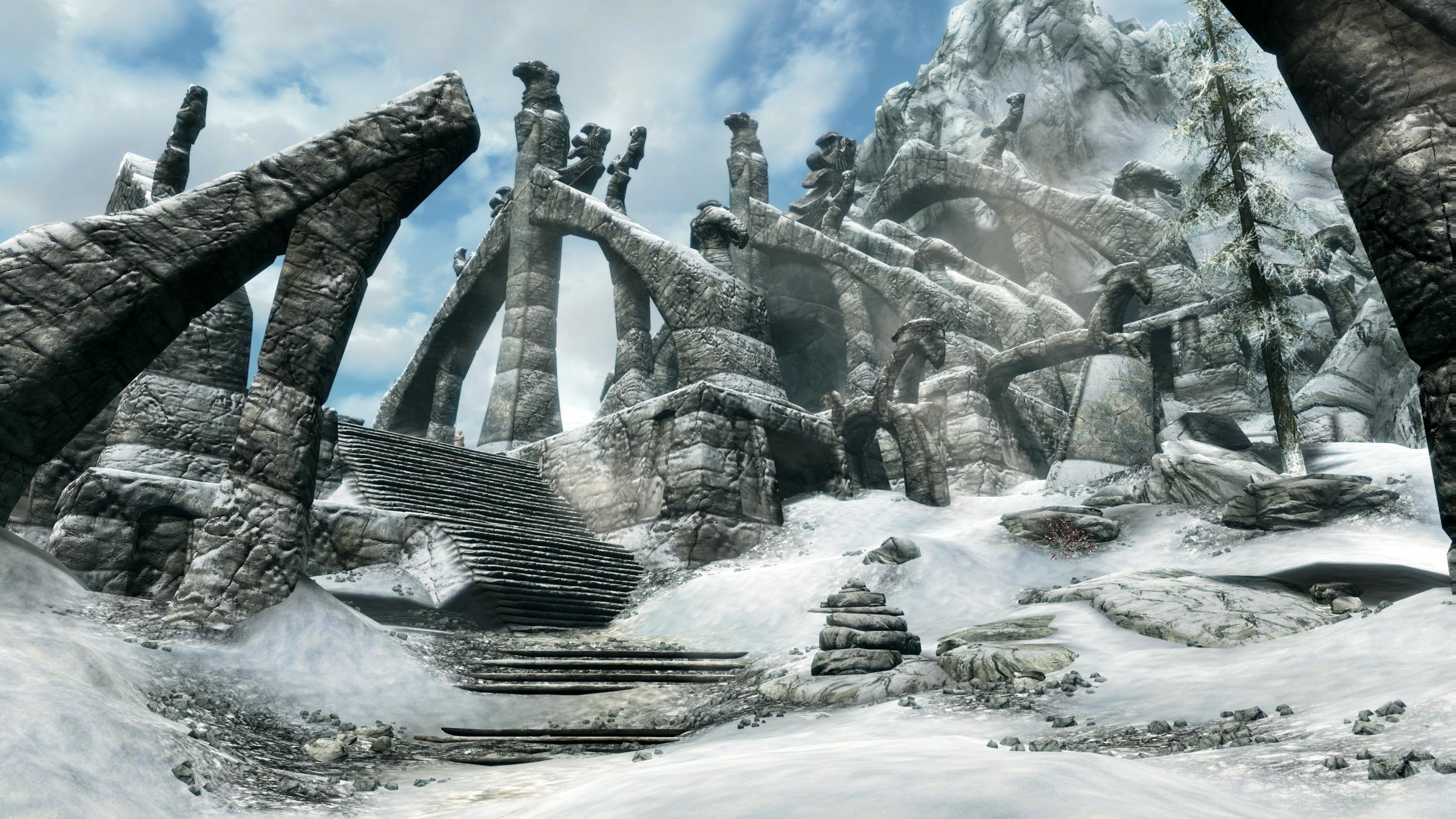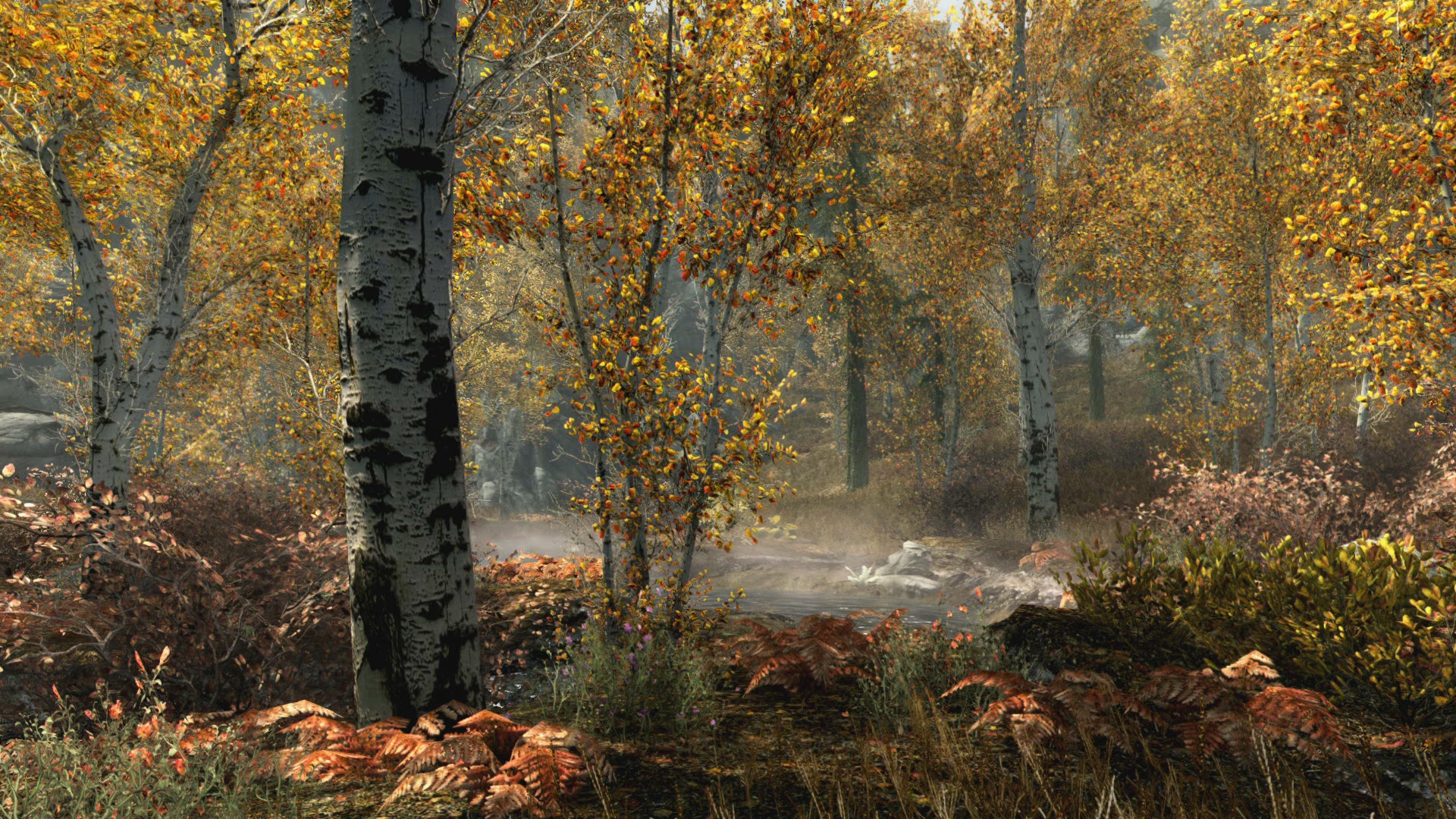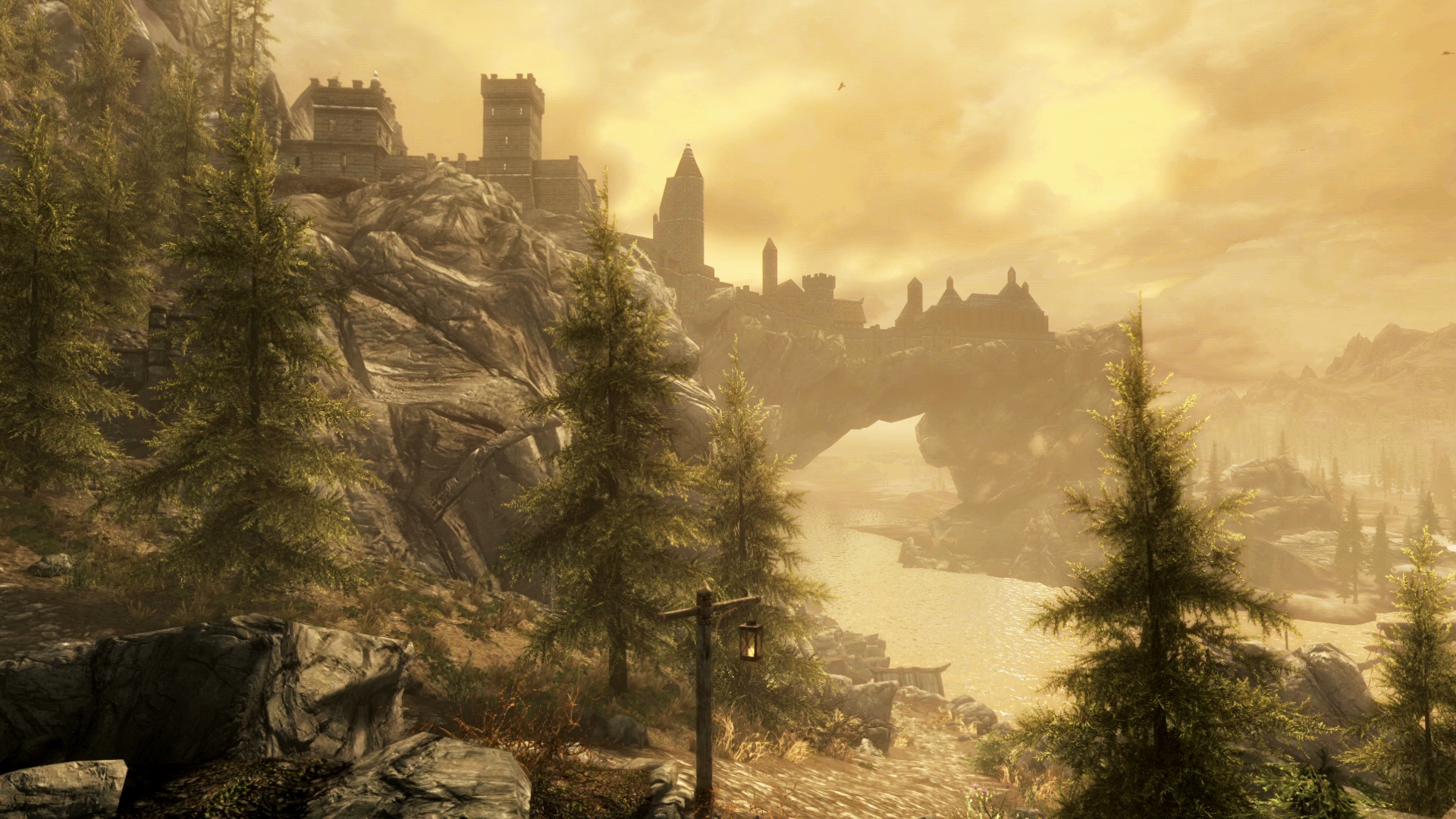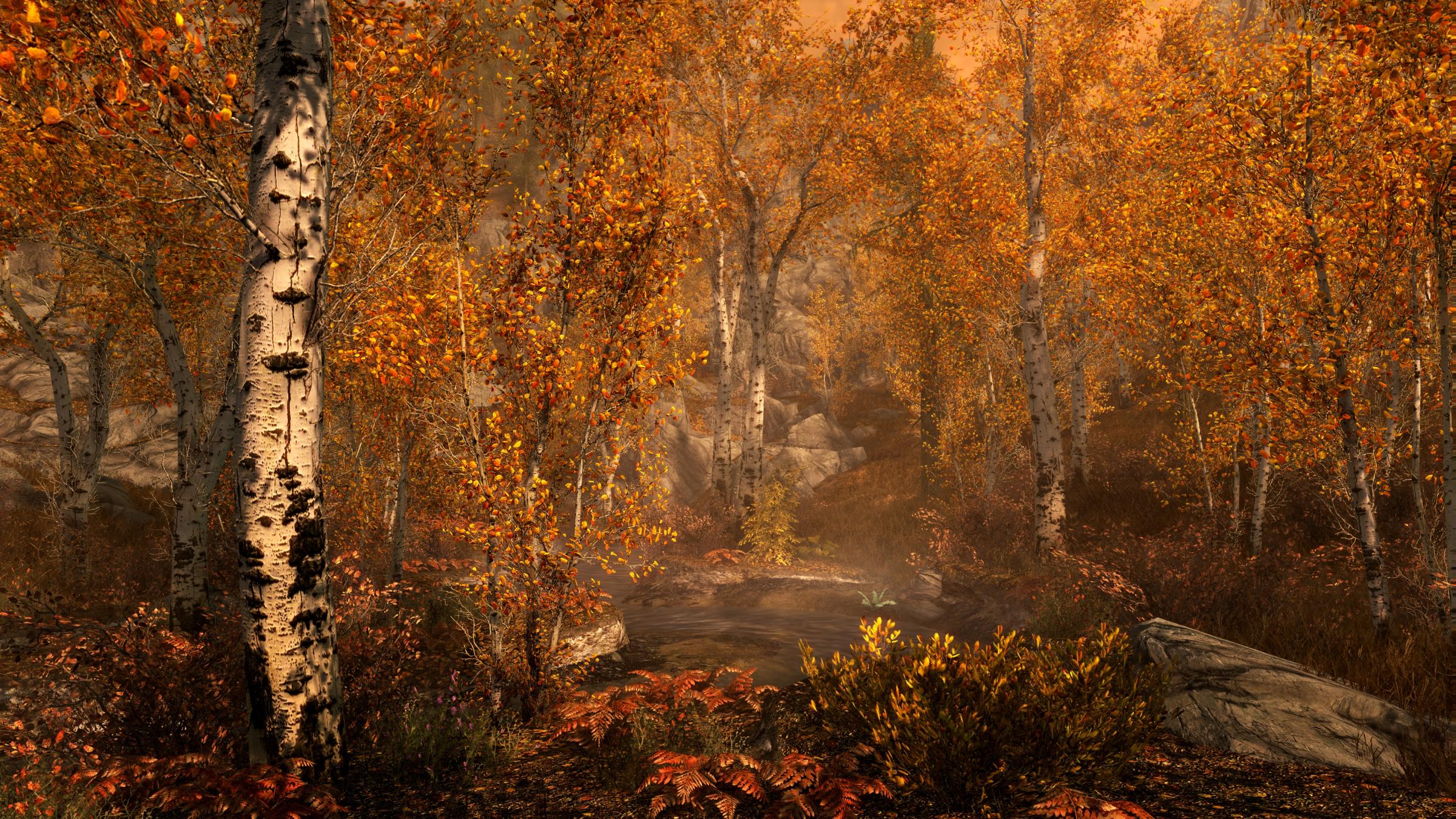It’s back. That gaping temporal life-sucking maw. The one that launched a thousand listicles with wonky names like “SkyUI” or “Moonpath to Elsweyr.” That had an awkward cameo on a show your parents (and probably their parents) watch. You know, the thing you’ve been playing since its launch back in 2011 through what, last week?
The Elder Scrolls: Skyrim Special Edition is upon us. Bethesda’s improbably popular roleplaying opus—it’s sold north of 20 million copies to date—has been visually remastered to look like the sort of thing you might buy new in 2016. You can play it on PC, PlayStation 4 or Xbox One as of Oct. 28.
I spoke with the game’s director (and jumbo-sized roleplaying genre doyen) Todd Howard. Here’s a lightly edited version of our chat.
TIME: I’ll start with a confession. I played Skyrim for hundreds of hours, but I’ve never finished the central story. Maybe you can tell me how the game ends.
Todd Howard: It’s a very common thing, I’d say, with all of our games. Even when we’re playing it in the office, if we have a goal, we’re trying to test certain quests. There are so many things that can distract you and tickle your curiosity that you end up, even when you’re working on the game, not accomplishing what you set out to do or to play that evening.
It’s such a big thing, such an easy-to-get-distracted thing. I assume most only see a fraction of the content. How does that sit with you?
I think in general it’s a positive thing. If someone’s playing the game and enjoying themselves, that’s all we want. I’m a believer that players are good self-directors, and I think one thing that’s good about video games is they can direct their own experience. As opposed to saying, “Here’s all of the beats that you must hit.” They know if they want action, or they want downtime, or they want to talk to characters.
I think it’s up to us to make all of those avenues meaningful for what they are. You know, we’d like people to finish our quests. There are so many areas that we put work into that people don’t see, so it’s not necessarily just this particular quest line. I think one of the things that works, because our games aren’t multiplayer, is that when you talk about the game with somebody else, you can compare things you did and they’re very different.
I think there’s always going to be this huge percentage that the majority of our players never see, but when they talk to somebody about it, that moment of sharing their experiences, they end up different and that’s a really good thing.

Skyrim and Minecraft had these coincidental parallels. Skyrim was better known at launch, but there was an awareness tipping point for both games, where they might trounce headline news stories in traffic monitors. And this went on for years with Skyrim. I had editors at TIME looking at the daily reports and asking me “What the heck is this thing?”
There definitely was a tipping point somewhere right before it came out, and I can’t tell you what that was. I think there was just a lot of energy around the fact that the game was a bit of a throwback. This is the way some games used to be, these open experiences. I think it did tap into that. And the thing I was saying before, where people could share their experiences, and that it wasn’t that intimidating to play.
What was it like for us? We definitely felt it, and it’s a great feeling. You never know how your work is going to be received, and to have it be not just received by the people who wanted it or knew about it or our traditional fan base, which is pretty big, but also having it spill over to everybody who plays games, and then those people telling everybody else who doesn’t play games. That’s what it became.
Minecraft is like that, where you might say to one of your friends who doesn’t play games, “Hey, just sit down and try this with me.” There are other games you might put in front of somebody and say, “I know you don’t traditionally play games, but you’ve got to check this out.” Then it sucks those people in as well. There was a big word of mouth thing happening there, I think. Very much of what I’ll call a sofa experience, again, since it’s not multi-player.
You hear a lot of stories about people sitting down with friends or kids or uncles or other family members and playing it together and showing it to them. We get a lot of letters, like, “This was my first experience like this, and I shared it with this other person who I know well.” Maybe that has something to do with it. At the end of the day, I’m just guessing, to be honest. I don’t know for sure.
It seemed to speak to this appetite for more pliable, unpredictable experiences. Skyrim‘s power fantasy hero’s journey framework belies this deeply nontraditional thing that happens when you start disappearing down its rabbit holes.
We spent a lot of time on ensuring it has a good flow. A lot of times when someone’s going to pick up a game, it can be a bit daunting. Like if they haven’t played a roleplaying game, or they haven’t played things in the series. We spent a lot of time on flow. How it feels to move through the world. How the game rewards you depending on which way you turn. I think that made people who didn’t traditionally play this stuff like it more. That they could carve their own direction, and that the game is pretty good at feeding them ups and downs.

What was it like coming back to the game, thinking about things that worked and didn’t work? Since the gameplay hasn’t changed and just the visuals, were you much involved with the remaster?
I was involved as much as I needed to be in terms of it getting off the ground and playing it. It was a thing we did internally as opposed to farming it out. It was the first time we’d ever done a remaster, and it had come up before whether to do one. We ported Skyrim to the Xbox One when we first got kits, kind of as an exercise. It’s a good way to learn hardware.
Hard games require a lot of data, so even though we were doing Fallout 4 at the time, it wasn’t fully built, so you can’t really stress the system. We ported Skyrim over and that’s where it got in our heads, “This game is still really fun. Maybe we’ll come back to it.” Once we were done with Fallout 4, before that we knew, “I think we’ll come back to it. We really enjoy it.” But it’s still the only time where we’ve done that, where you’re picking up a game five years later and then playing it, and I think that this will be a positive and a negative.
It didn’t jump out at me that it was new or old. It looks like a game of today now. You know, if I pull the old one up, there’s a stark comparison between a PlayStation 3 or Xbox 360. It feels like a modern game. I still think the sense of being in that world is central. We’re really big on tone. That moment of standing over a valley, and there are the clouds and the mountains, and a dragon comes by, it’s still just fucking awesome. I didn’t used to think that, but now that I’m five years from it, it really hits me right in the middle, and I think it’s great.
There are clearly some things that stick out that I think haven’t aged as well. Some of the character stuff doesn’t do as well as the environments. We were able to draw so much further and put so much more on the screen in terms of foliage and everything. It really looks great.
But I will say the game gets its hooks in you. You forget, like that flow I talked about, you forget how much the time seems to go away when you sit down in front of Skyrim. You sit down to play it for a half hour, and then you look up, and how have three hours gone by? It has that very special hook.
We’ve had Grand Theft Auto V and The Witcher 3 in recent years, but no one’s tried to one-up Skyrim‘s “Be whoever you want to” vibe. Is that just down to these being enormous financial resource drains?
I think that’s true for a lot of big, popular games out there. Particularly the larger ones. You can look at Grand Theft Auto and no one’s topped that and what they do, or some other games out there. Clearly I thought The Witcher 3 was a fantastic game. There just aren’t that many, I think, because of the time and technology involved. When you look at The Witcher, that was their third one.
It’s not like The Witcher 3 came out of nowhere. They’d been working on that for a long time, building to it in the same way we built ourselves up over the years. I think that’s maybe why you see it. Skyrim was our fifth in the series, and we did Fallout 3 before it. I think a lot of it goes to the teams. I think you look at the really successful well made games that are consistent, and they’re made by teams or studios that have been at it for a while.
You look at Naughty Dog and how they’re building their games. Our studio here, a lot of us have worked 15 or 20 years together, so the same people making what you could say is a similar style of game. This is the style of game that we love. I think that’s really rare in our industry. I think those are probably the reasons more than anything.

Do you remember Tom Bissell’s Grantland piece? He loved the game, but had problems with what he called its “fantasy novel” dialogue. He seemed to be getting at what I’ll call the uncanny valley of scriptwriting. That as the world-building becomes more plausible in these experiences, the earnest fantasy dialogue gets harder and harder to go along with.
Well first, I vaguely remember Tom’s piece, and I’ve always really liked his critiques. I think he’s a really good writer in our industry on that stuff. I remember at the time thinking that was a really good critique.
To the overall point of how we tell stories in these particular kinds of games, where they’re so open, I think we’re getting better, but we haven’t solved it to our level of satisfaction yet. I think it’s probably the hardest thing to do and as we go forward on projects. Again, we’re going to try new things when it comes to that. I think sometimes we’ll take two steps forward and one step back, but it’s definitely something we haven’t solved yet.
What about the solipsism of the hero’s journey in these games, where you’re really the only agent, and everyone else is just a signpost pointing you on your way?
We’ve talked about that a lot. That’s actually one of my pet peeves. A lot of designers will write a quest and then they’ll have this section of dialogue that explains all the reasons the person asking you to do it can’t do it. “I need you to go get this magic ring and here is why I cannot do it,” or whatever. Then you get into this conversation of why they can’t do it, and you see all the logic holes. And you’re like, “Well, you could do it if you just…” And so we hand wave that. We don’t even bring it up.
What works best, I think, are situations and characters that are very reactive to what you’re doing in the moment. I think we can write down stories the player will experience over the course of the game, which for a quest line can end up being 10 or 20 hours. But I think some of that gets lost in the minute to minute. So we found over time that what helped was having the characters be as reactive as possible. Having other characters that are also doing heroic things like you are, or commenting on your actions, is a good thing, and we can do more of that.

I asked Peter Molyneux some years ago, since he likes to invert things, if he’d ever considered making a game where instead of the zero-to-hero trope, you have to play hero-to-zero. You start with all the power, then the journey is you divesting it, pushing back against the dominant hierarchical species-level thing.
We tried somewhat, and this was coming off of . . . We tend to alternate our games. Once we tell one story, we want to tell something that’s almost its opposite. Coming off of Morrowind, where it’s prophesied that you’re walking in the feet of a legendary hero, we did Oblivion. And with Oblivion, you’re not the main hero. It’s this other person, Martin Septum, who’s the guy. You’re almost playing Lancelot to Arthur.
We weren’t completely successful, but that was kind of the “Put a good man on the throne” kind of thing. Find the right person who should be emperor, and it’s not you. That’s probably the only time we touched on that. Then you come back to Skyrim, and it’s okay, no, you need to be the hero. We have ideas for the future, but it always waxes and wanes when it comes to that stuff.
Okay, last question, and it’s the deepest, most probing thing I could ask you: Why do you make such ginormous hint books? What was Skyrim‘s? 600 pages? High 500s?
Yes, huge. If you drop that it’ll kill a child. I’ve always really liked having this tangible tome of “This is everything we did.” Even though it’s not everything. Handbooks these days don’t sell that well. There’s not as many of them for a lot of reasons, namely the Internet. But we still like them, and ours sell really well. They’ll hit Amazon’s bestseller list when they come out.
It’s a lot of work, but our fans seem to really enjoy them still, and we enjoy them and putting them on our shelves. Often when we’ll be working on a new game and we need to refer back to something, we’ll just look it up in the handbook. Like, “What was that particular thing we did? Okay, I’ll flip open the handbook. How does that work?” Believe it or not, it’s faster.
More Must-Reads from TIME
- Caitlin Clark Is TIME's 2024 Athlete of the Year
- Where Trump 2.0 Will Differ From 1.0
- Is Intermittent Fasting Good or Bad for You?
- The 100 Must-Read Books of 2024
- Column: If Optimism Feels Ridiculous Now, Try Hope
- The Future of Climate Action Is Trade Policy
- FX’s Say Nothing Is the Must-Watch Political Thriller of 2024
- Merle Bombardieri Is Helping People Make the Baby Decision
Write to Matt Peckham at matt.peckham@time.com